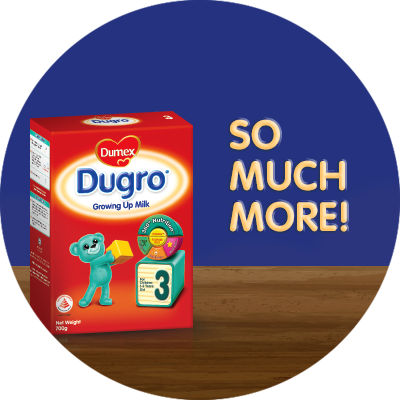Breastfeeding is the best for babies and a healthy diet / maternal nutrition is important when breastfeeding. A decision not to breastfeed can be difficult to reverse. Infant formula is suitable from birth when babies are not breastfed. It is recommended that all formula milks be used on the advice of a doctor, midwife, health visitor, public health nurse, dietitian, pharmacist, or other professional responsible for maternal and child care and the financial implications should be considered. All preparation and feeding instructions should be followed carefully as inappropriate preparation could lead to health hazards.
Importance of Building Natural Immunity with Dumex Mamil Gold

Parents work tirelessly to provide their child with everything that they could ever need and want – from the best merchandise to the best attire, and from the best meals to the best experiences. As parents, we would do anything in our power to make sure our child lives comfortably and remains happy and healthy at all times. While we do our best to shield them from any harm or danger, safeguarding our child’s growing immune system from sickness and viruses can be tricky.
As a young child’s innate and adaptive immune systems are only starting to mature, there is a risk of contracting viruses, bacteria, fungi and parasites1.
Common infections in children
Infections caused by viruses are universal during childhood and adolescence as they are more vulnerable. Here are some common viruses that affect children2:
Stomach virus
Gastrointestinal viruses, or also known as tummy troubles, cause children a lot of problems such as dehydration resulting from diarrhea, or constipation due to their immature digestive systems, making it harder for them to absorb food and nutrients efficiently.
Common cold
Through direct, indirect contact and droplet transmission from a person who has a cold, a child can easily contract the same virus. This results in a runny nose, nasal congestion, sneezing, coughing and a mild sore throat. Sometimes, symptoms can also manifest in loss of appetite, tiredness and fever.
Influenza, or the flu
Although children can contract the flu the same way as common colds (direct and indirect contact as well as transmission of droplets), the influenza virus is also airborne. Now, even more than ever, parents are worried about their children’s immunity. Symptoms for influenza-like viruses include fever, chills, cough with or without headache, tiredness and sore throat.
It’s all in the diet
There are, of course, certain measures that we can take such as getting comprehensive vaccinations, practicing good hygiene and ensuring that our child receives ample nutrition. Factors such as the diet have now been proven to have a long term influence on the immune system, brain development and metabolism. Diet content and quantity plays a huge role in the shaping of the human microbiota composition and function.3 The host’s health is often the result of the complex interaction between nutrients and microorganisms.
Simply put, you are what you eat, and what you eat is directly responsible for your health; just as how what your child consumes has the ability to boost their own immune system and natural defences. Hence, as parents, it is our duty and responsibility to ensure that they achieve optimum health and defence.
The key to a strong immune system
To support the development of our children’s defences so that they will be able to cope and counter illnesses and disease, it is crucial that we provide them with beneficial nutrients.
For starters, be sure that your child consumes a diet that is rich in essential vitamins and minerals that support the immune function, such as Vitamins C, D, A, protein and zinc. More importantly, however, Vitamin D is one that we should not skimp on as a deficiency in this vitamin is linked to an increased risk of infection. As Vitamin D is only found in certain foods, such as fortified milk and fatty fish, it is possible for people to lack Vitamin D4.
A healthy immune system is also dependent on getting enough Vitamin E, as it directly contributes to a stronger immunity, as well as healthy skin and eyes. Vitamin E also protects cells from damage.5 Foods rich with Vitamin E include nuts, seeds, avocado and salmon.
Zinc, on the other hand, is known to play a critical role in biological processes including cell growth, differentiation and metabolism. Zinc can be found in seafood, meats, mushrooms and lentils. The deficiency of zinc affects childhood growth and decreases resistance to infections6. Hence, it is best to supplement your child’s diet with zinc.
Last but not least, opt for the added and extra boost that prebiotics can provide for your children. As 70-80% of immune cells are located in the gut, the immune system’s development relies on establishing a balanced and diverse gut microbiota in early life9. Prebiotics help nurture the growth of good gut bacteria and microbes, which are responsible for regulating the immune system and preventing the growth of disease-causing bacteria8. Prebiotics are often found in bananas, chicory and onions, for example.
Build your child’s natural defences with Dumex Mamil Gold
As Dumex understands the need for children to fortify their natural defences, the all-new Dumex Mamil Gold was developed to assist both parents and children in their journey to a healthier defense system.
The Dumex Mamil Gold range formula comprises all of the beneficial and essential ingredients which were mentioned earlier such as Vitamins D & E, DHA of up to 75mg per 100g (only in Dumex Mamil Gold Step 3, 4 & 5), calcium and most importantly, a unique prebiotic blend of GOS/IcFOS in the optimum ratio of 9:1.
In line with Dumex’s promise of using only natural ingredients in their formulas, the prebiotic blend contained in the Dumex Mamil Gold products includes chicory root and milk, which support a healthy gut and one’s natural8.
Start building your child’s natural defences together with Dumex. Find out more at dumex.com.sg.
1. Simon. K, et al.. (2015). Evolution of the immune system in humans from infancy to old age. NCBI. Retrieved April 16, 2020, from https://www.ncbi.nlm.nih.gov/pmc/articles/PMC4707740/
2. Common infections and your child. Caring For Kids. Retrieved April 16, 2020, from https://www.caringforkids.cps.ca/handouts/common_infections_and_your_child
3. Zmora, N., Suez, J. & Elinav, E. You are what you eat: diet, health and the gut microbiota. Nat Rev Gastroenterol Hepatol 16, 35–56 (2019). Retrieved April 16, 2020, from https://doi.org/10.1038/s41575-018-0061-2.
4. Remmer, S. (2020). Are There Immune-Boosting Foods That Your Kids Should Be Eating Right Now?. Sarah Remmer. Retrieved April 16, 2020, from https://www.sarahremmer.com/are-there-immune-boosting-foods-that-your-kids-should-be-eating/
5. Vitamin E. WebMD. Retrieved April 16, 2020, from https://www.webmd.com/diet/supplement-guide-vitamin-e#1
6. Darnton-Hill, I. (2013). Zinc supplementation and growth in children. World Health Organization. Retrieved April 16, 2020, from https://www.who.int/elena/bbc/zinc_stunting/en/
7. Outlook - The News Scroll. (2020). Are Prebiotics Important for your Child’s Immunity? Retrieved April 16, 2020, from https://www.outlookindia.com/newsscroll/are-prebiotics-important-for-your-childs-immunity/1756226
9. Vighi G, et al. Allergy and the gastrointestinal system. Clinical and Experimental Immunology, 153 (Suppl. 1): 3–6.

Ask Our Careline
Whatever’s on your mind, we’re here to help




